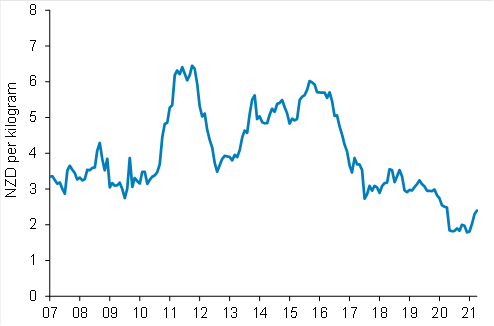NZ Business
With wool prices at rock bottom, the only way is up
Susan Kilsby
Agricultural Economist
ANZ New Zealand Ltd.

While many of the country’s primary products, including dairy, wood and meat, saw prices rise in the 15 months since Covid hit, it has been a much gloomier picture for our country’s wool growers.
Mainstream wool prices have nose-dived since the start of last year, with strong wool selling for as little as $2 per kilogram, a third of what it was worth five years ago.
While prices have continued to bounce around at low levels, for many farmers the cost of shearing is now more than they earn from selling the wool, making it a net cost to their business.
For the moment, many farmers are prepared to carry the cost of shearing, seeing it as an animal health cost, but the current situation is not sustainable.
This season it’s estimated New Zealand will produce 133,000 tonnes of wool, down 2.8 per cent on last year, and our lowest level of wool production in modern times, a direct reflection of declining sheep numbers.
There is no doubt some farmers have been under additional financial pressure due to the low prices, but there are also good reasons why wool is here to stay, why it plays a vital role in a diversified and sustainable farming sector, and why there are many reasons to be optimistic.
" There are good reasons why wool is here to stay, why it plays a vital role in a diversified and sustainable farming sector, and why there are many reasons to be optimistic."
Susan Kilsby, ANZ NZ Agricultural Economist
On the Farm
There is no question the low price of strong wool has hit farmers in the pocket, but for most of them wool is only part of the equation.
They are also meat producers and most have benefited strongly from improved and consistent lamb and mutton prices in the past few years.
On many of these farms, wool makes up less than 10 per cent of total farm income, and overall combined income from both meat and wool has increased in recent years.
This has meant the negative impact of low wool prices has been less than expected, and has been able to be absorbed by most farmers.
It also means any increase in the price of wool will go straight on to farmers’ bottom lines, which bodes well for when wool prices do eventually pick up.
Although wool production may currently be a cost to many farmers, the way meat prices have supported farmers through this period is a reminder of the continuing value of diversification.
Multiple sources of income on a farm make them better able to weather unexpected changes in the market and be more sustainable as a business.

Sources: Wool Services International, PGG Wrightson, ANZ Research
International Markets
On the international market, wool buyers remain active, with steady demand coming from China, New Zealand's largest market for wool, taking about a third of exports.
We have seen more subdued buying from India and Nepal, possibly due to the health challenges these countries currently face as they try to control Covid.
Some international buyers, especially carpet makers, contract to buy their wool well in advance, which means they are only now benefiting from the lower prices.
Despite the disruptions to global shipping and the ongoing shortages of containers, low wool prices mean carpet makers can make good returns.
Manufacturers may seek to make the most of the situation and choose to stimulate additional demand by offering lower prices to consumers.
There is currently a lot of wool in storage in New Zealand, which could delay significant price rises, but overall, brokers are confident prices won’t slide further, and that they will gradually return to more profitable levels.

ANZ agricultural economist Susan Kilsby
Consumer Demand
There’s no doubt the global Covid pandemic has had a profound impact on consumer preferences, with people wanting to know more about where products come from and how they are made.
The sustainability, health and environmental impact of a product, along with a strong interest in it being locally-made, now play a greater role in purchasing decisions.
Being biodegradable, hygienic, naturally fire retardant and sustainably produced, New Zealand wool is of increasing interest to consumers.
We’ve recently seen one of the country’s largest retailers of furniture and bedding, Big Save Furniture, launch a range using woollen padding and upholstery.
There are also other novel uses of the fibre, from using it for packaging and hygiene products to making boat hulls from it, that aim to replace products derived from petroleum with wool.
This renewed interest in the fibre is important, as each new product creates another market for wool, and with it the potential for increased demand and improved prices over time.
Innovations like these can also increase public awareness of the benefits of wool in other products, and their success is likely to encourage other manufacturers to join in.
While these new and innovative wool products will take time to scale up, and patience will be needed before farmers see higher prices, it’s clear wool’s special qualities, and our expertise in the producing the fibre, stands New Zealand in good stead when the world wakes up to its potential.
This article first appeared on Stuff.co.nz on 18/06/21
RELATED ARTICLES
NZ Media Releases
ANZ offers flood assistance package for Canterbury businesses and farmers
NZ Business